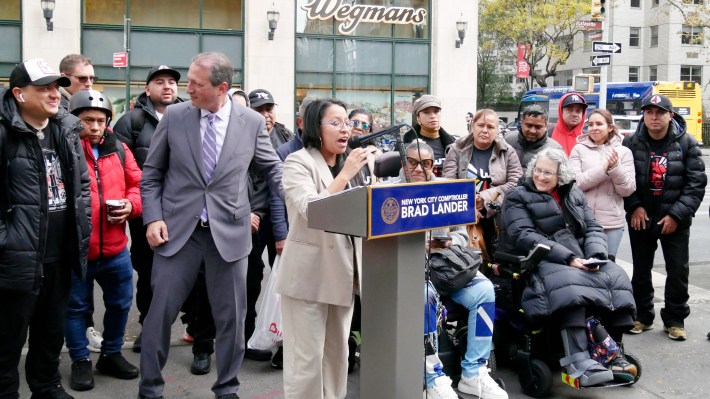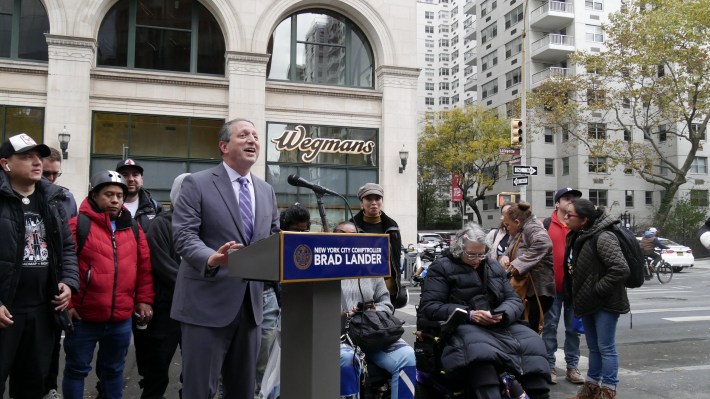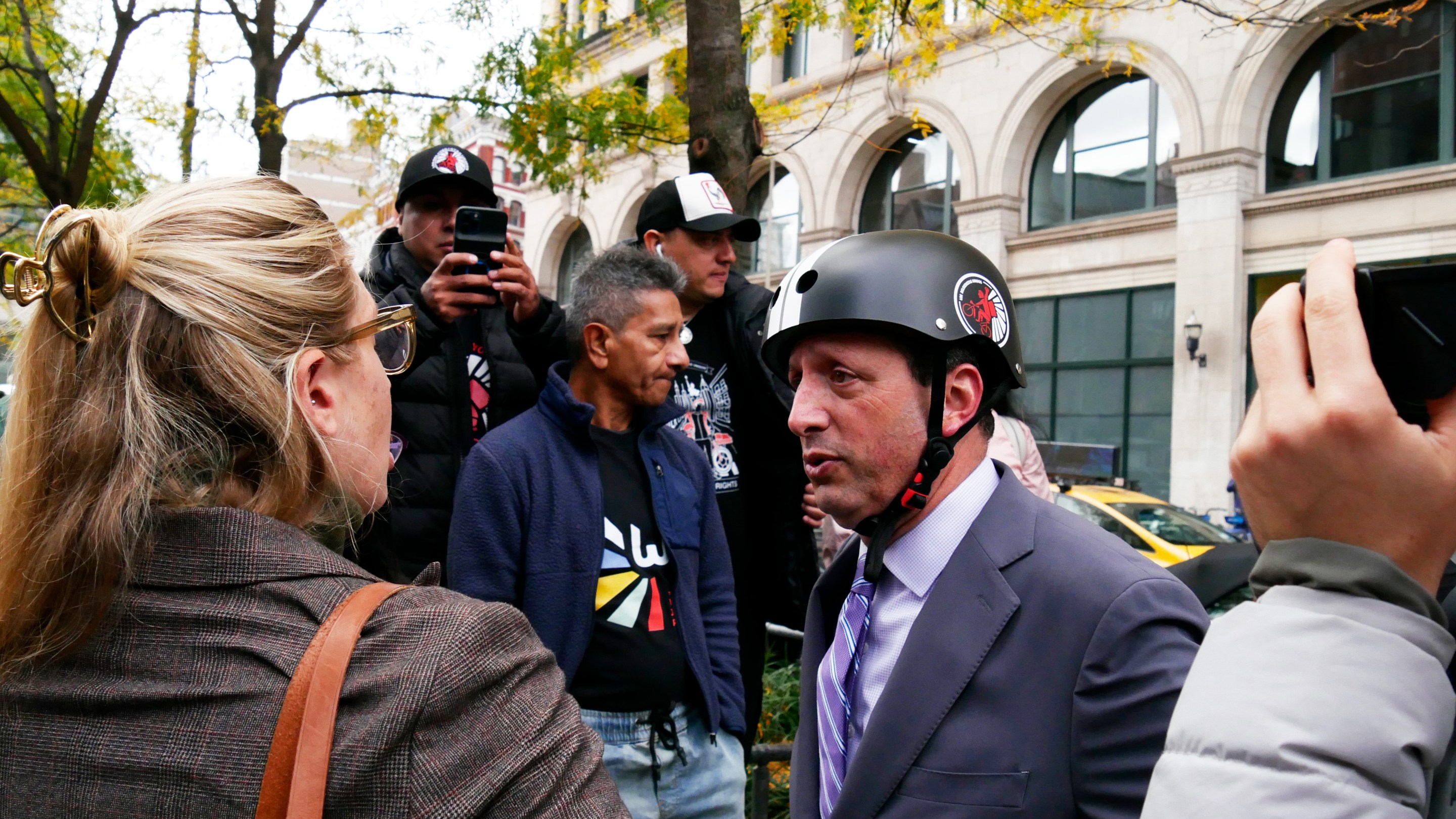The app-delivery industry just needs a little TLC.
City Comptroller Brad Lander wants to regulate app-based food delivery companies much like the Taxi and Limousine Commission oversees Uber and Lyft — his attempt to address the growing perceived threat to safety that is stoking anger at delivery workers instead of at the profit-making companies that send them scurrying to make absurd deliveries for meager wages.
The new call to action comes from a report released on Tuesday, “Strategic Plan for Street Safety in the Era of Micromobility,” whose main suggestion is a “city-administered licensing program” to regulate the app-delivery companies, notably different from the multiple city and state bills that seek to put registration burdens on individual workers.
Lander says it will alleviate "mode-rage" against e-bike and moped users.
“New Yorkers should not have to feel on edge every time they leave their apartment," he said. "The changing patterns of vehicles on our streets does not have to fuel a sense of disorder and lawlessness in our city."
Another Taxi & Limousine Commission?
Lander is entering the fray after more than a year of intense city action.
delivery worker hubs (already promised, not yet built), charging infrastructure (the city is piloting this), increased enforcement, and better street design.
And in January, the mayor said he would create a new government agency, the "Department of Sustainable Delivery," which would work to address these same questions (that said, there have been no updates given on where that new agency stands or what it would do).
But Lander's report adds in a new level of regulation: a requirement that app-delivery companies obtain a license to operate a food-delivery business in the city. This new regulation would require the apps to:
- Share “real-time” anonymized data with the DOT to inform infrastructure decisions.
- Fund and implement more safety training.
- Use their algorithms to promote safety, rather than speed.
- Follow an “accountability protocol” they are penalized when their workers break safety rules.
- Pay a fee for each illegal moped seized during a delivery trip, and the fee cannot be passed to workers.
- Stop deactivating workers' accounts “arbitrarily,” with strict consequences.
- Fund and construct delivery worker hubs to provide resources like safe charging infrastructure.
It is unclear if the new regulations might include some demand-side solutions, such as charging app customers more if they order from restaurants further from their homes, a pricing proposal that could reduce long trips, as Streetsblog reported.
Lander cited the Taxi & Limousine Commission, the city agency that reined in ride share companies (albeit after-the-fact), when asked about this part of his proposal.
“The Taxi & Limousine Commission licenses Uber and Lyft and requires them to provide regular data that is part how many vehicles are out there, because there's a set of traffic questions, what is the pay and also whether the vehicles that are being used as part of that business are operating safely,” Lander told Streetsblog.
That said, the TLC has been under fire recently after a Bloomberg investigation revealed app companies are restricting access, and worker-focused advocacy groups say they do not want to see this model adapted for delivery-app companies.

Ligia Guallpa, the executive director of the deliverista-rights group Worker's Justice Project, said she "doesn't support a TLC model," because that agency regulates workers instead of industry. That's why she favors Lander's approach, which would not require delivery workers to register their e-bikes like cars but use the tech company's algorithms to incentivize safety.
By requiring companies like DoorDash and GrubHub to limit the pace of work and the amount of deliveries a worker can make in certain timeframes, the regs would, in theory, force these giant corporations concerned with their bottom line to stop prioritizing profit, Lander believes.

“This is why the licensing program is needed in the first place,” Lander told Streetsblog when asked how the city will get the apps to ignore profit motivations.
“Yes, of course, they want to get the food there while it's still hot, but if they have a legal obligation to make sure it's on a safe vehicle, the vehicle is being operated safely and that the city will see that trip when the reporting is done. Now you can manage the fleet as a whole and make sure that you're operating it in a way that that's what you've got to do to keep your license.”
'Sense' of danger
Lander said he hears concerns from city residents constantly about the fear they have of mopeds and e-bikes.
“If you talk to people, you know it really is a dramatically felt sense that a very broad set of New Yorkers have that the proliferation of moped and e- bike use has grown in a way that our regulation and culture has not kept up with,” said Lander. “We've got to do something to restore a sense of safety on our streets.”
The keyword, sense of safety.
Lander is toeing a delicate line over which many politicians have tripped. The self-styled safety group E-Vehicle Safety Alliance — which was notably absent from the event on Tuesday — focus their advocacy the supposed danger of electric bikes and mopeds at the exclusion of the most dangerous vehicles on the road: cars.
As a result, Council members consistently misstate the dangers of mopeds and e-bikes, and propose solutions based on that misperception. At a recent EVSA meeting, for example, Council Member Bob Holden said e-bikes and mopeds have ushered in “the most unsafe period in the history of New York," which is simply not accurate — unless, of course, he is referring to the safety of delivery workers.
In 2023, 62 micro mobility riders were killed in crashes; in contrast, there were two deaths caused by the drivers of micro mobility vehicles, according to the report.
Lander emphasized that people who are upset about mopeds and e-bikes, such as the EVSA, need to advocate for broad-based safe systems rather than merely regulating one device.
“I want a city that has more places where we invest in the infrastructure, more places where we create plazas and protected bike lanes and things like the 34th Avenue open street [in Jackson Heights]," he said.
UberEats, Doordash, and Grubhub declined to comment on the report's proposals.






